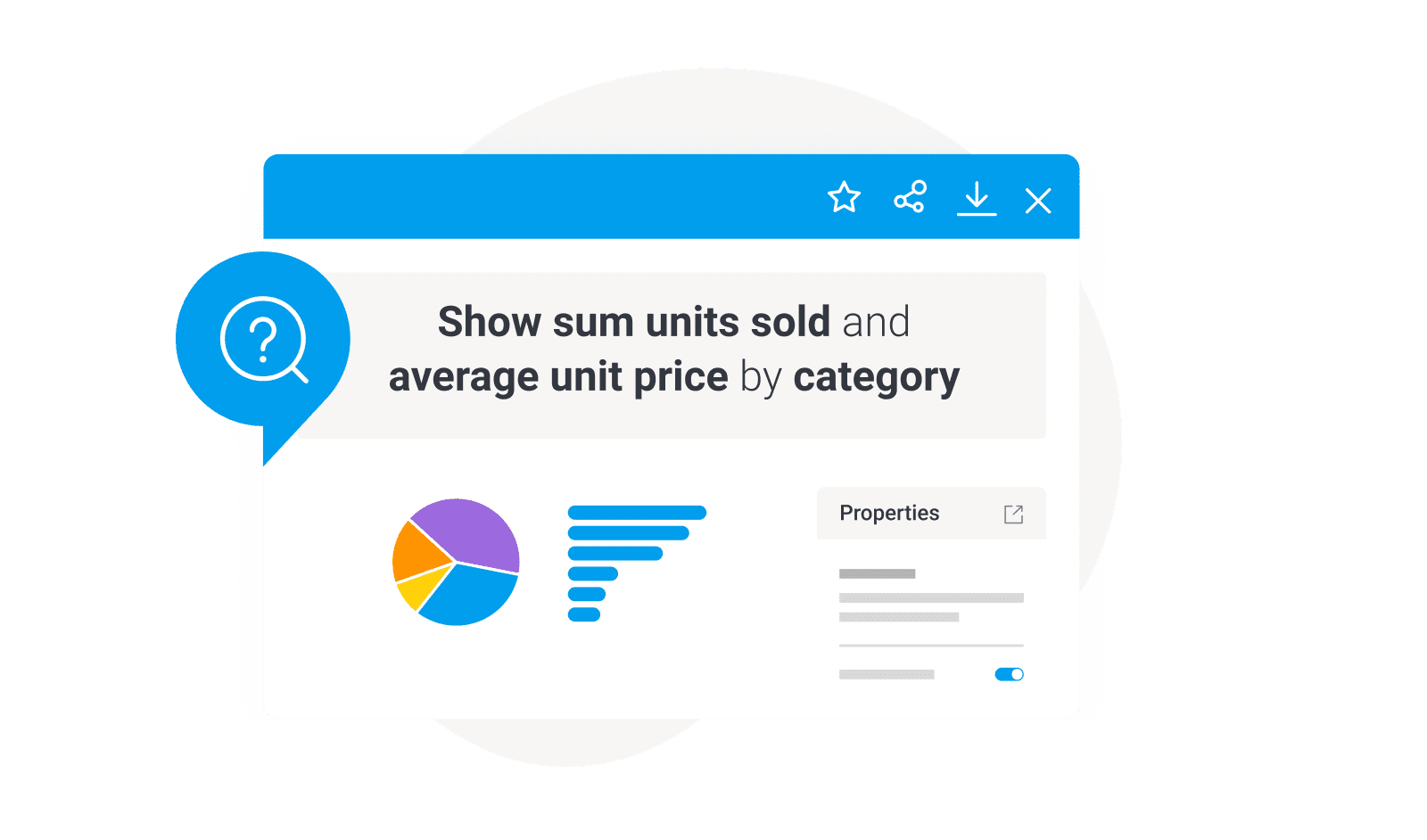Glossary
Natural Language Query
What does NLQ stand for?
Natural language query (NLQ), also known as natural language search, is a self-service business intelligence (BI) reporting capability that enables analytics users to ask questions of their data using business terms typed into a search box, or via voice command. It parses for keywords and generate relevant answers sourced from related databases, with results typically delivered as a report, chart or textual explanation that attempt to answer the query, and provide depth of understanding.
How does NLQ help analytics users?
NLQ forms part of the rise of the augmented consumer trend, one of several modern analytics tools which aim to help democratize analytics for everyone by providing a true self-service BI solution that non-technical business users can leverage to make decisions, without having to defer to experts within the organization for assistance.
Business benefits of natural language query include:
- Drives adoption of self-service analytics for business users resistant to using visual-based BI interfaces, such as dashboards
- Extends access to self-service analytics to non-technical business users, not just highly skilled experts and analysts
- Generates relevant answers in chart or report form that unify fact and context for deeper insights
- Provides a starting point for answers that can be combined with other tools, such as dashboards and data storytelling
Read more: What is natural language query?
Types of natural language query
Natural language query tools process users’ questions via several different techniques, such as keyword search, voice interaction, and translation of typed terms into natural language questions using natural language processing (NLP) technology. The look, feel and application of NLQ within a BI platform, and where it can be accessed within the UI, is dependent on which techniques the software vendor has chosen to implement.
Today, natural language query fall under two distinct types:
1. Search-based NLQ
The predominant approach to NLQ technology today is search-based, with questions typed into a free search box and matched with elements in related databases. Search-based NLQ tools are typically embedded within the user interface of the BI platform in question, such as a dashboard, and offer varying levels of sophistication in terms of the analytical complexity of questions, data volumes and data types supported. Because search-based NLQ tools must be able to understand the language of the user’s query, many only support basic questions.
Currently, search-based NLQ tools have faced low user adoption due to a number of factors. The primary challenge is that they provide little to no guidance on what questions to ask using the tool, or how to use it. Self-service BI users without prior knowledge or analyst skills are then forced to seek help from analysts to be able to use NLQ to its full capability. This challenge is what the second, newer approach to NLQ aims to eliminate.
2. Guided NLQ
Guided Natural Language, or Guided NLQ, is an approach to natural language query that guides the user through the process of formulating their query, by dynamically providing several lists of relevant questions, and prompting the user with popular suggested dimensions and filters, such as ‘count’ or ‘compare’ that helps them ask better questions of their data, and get more accurate answers.
To support a greater level of analytical complexity for questions and data types, Yellowfin currently offers Guided NLQ as a capability. Yellowfin Guided NLQ implements thousands of modelled question types and sequences to eliminate misunderstanding or ambiguity in the language used in a query. It also enables anyone to ask questions of their data, and to deliver answers as best practice visualizations or tabular reports for every potential question combination. Yellowfin Guided NLQ is designed for both non-technical business-users and advanced analysts to be able to build queries easily and gain fast answers, without outside assistance.
Read more: Guided NLQ – A simple way for anyone to ask the hard questions
Why should you use natural language query (NLQ)?
Natural language query is an integral part of modern self-service analytics solutions for its potential to assist mainstream business users in exploring their data and finding fast actionable insights without the need for extensive technical knowledge or external assistance.
For those users who don’t know how to explore their data and find answers using traditional visual-based tools (dashboards, reports, data visualization, etc), NLQ is a valuable pathway into finding relevant business information.
It’s clear NLQ is still evolving, and the purpose of Guided NLQ is to realize the technology’s potential further by helping the user build their query from start to finish. For more information on where to start with natural language for your BI initiative, we recommend watching the following explainer video from Ventana Research on NLQ.

